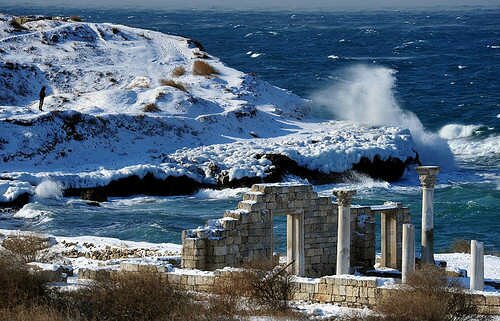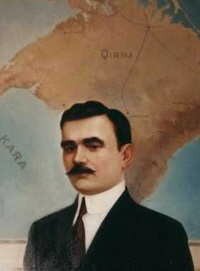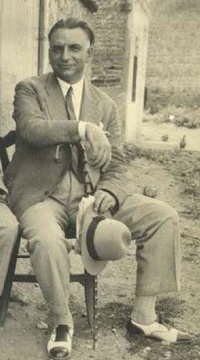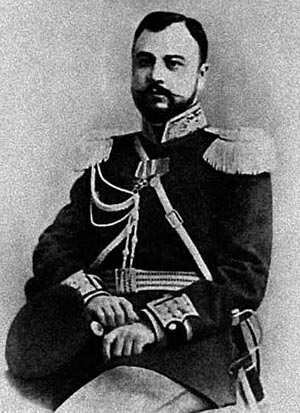
Oleh Makhno
Part 2
The February revolution of 1917 intensified the Tatars' national consciousness. First they stood up for national and cultural autonomy of the Crimea, and later — for its full independence. March 25, 1917 in Simferopol, was held a Congress of representatives of the Muslim population of the Crimea. It elected Executive Committee and removed from power the previous Russian administration. This Committee was opposed by both, the Tatar “Ulema Union” and members of the “Single-and-Undivisible Russia”. In July of the same year, the Committee sent two delegates — Jafer Seydahmet and Akhmet Azenbashel — to Kyiv as its representatives in the joint struggle against the Russian chauvinism.
July 24-25, 1917, was held a Congress of the Crimean Tatar delegates who had decided to fight for their territorial autonomy, to convene the Crimean Tatar Parliament — “Kurultai” — which did not take place because of the Bolshevik revolution.
The Crimean Tatars arrived in Kyiv for the Congress of the peoples of Russia. They promulgated the idea of territorial autonomy. At the Congress, the Crimean delegation purposefully met with Professor Mykhaylo Hrushevskyi.
 Mufti Noman Celebicihan |
November 23, 1917, took place a “Tauria Provincial Congress”, and the next day — a “Provincial Congress of Districts and Cities”, after which the so-called “Council of People's Representatives” was formed as the Interim Provincial Government of the Crimea. Chairman of the Council, was elected Mufti Noman Celebicihan, and Minister of Foreign and Military Affairs — Jafer Seydahmet. The Crimea was seen by the Tatars as the whole Taurian province, which included three districts to the north of the Peninsula, inhabited mainly by Ukrainians.
Proclaiming the 3rd Universal, the Ukrainian Central Rada (Council) joined the aforementioned districts to the territory of the Ukrainian People's Republic (Tauria without the Crimea), against which were the Tatars and Russians. In response to their protests, the Central Rada informed the Executive Committee that the UCR does not claim the Crimean Peninsula, recognizing it the Crimean Tatars' national territory. December 9, 1917 the Central Rada assured the Tatar delegation of eternal friendship feelings of Ukrainians to Crimean Turks, and then the Muslim Central Executive Committee recognized the Ukrainian People's Republic.
The Central Rada adopted (March 2-4, 1918) a law on territorial administrative division of the Ukrainian People's Republic (30 lands), by which the Crimea was not part of the Ukrainian state. Also in April M. Liubynskyi stated “the Ukrainian government has no territorial claims to the Crimea”.
At the same time, in the Crimea, the Bolsheviks and socialists broke their relations, and there happened armed clashes with the Black Sea Fleet, which ended in the defeat of the Tatar nationalists in the battle over the river Alma on January 13, 1918, and in the establishment of Soviet power in the Crimea.
 Minister of Foreign and Military Affairs Jafer Seydahmet |
The leaders of the Tatar nationalist movement took refuge in villages, where they led anti-Soviet propaganda and were preparing to revolt. Jafer Seydahmet moved to Turkey and signed agreements on Turkey's protectorate over the Crimea.
The political situation changed in April 1918, when German-Ukrainian troops liberated the territory of Ukraine from Bolsheviks. April 19, General Natiyev's Haydamaks Brigade crossed the border of the Crimea, and at the same time, Marine Ministry issued an order on Ataman Mesnikov's appointment the Commander of the defence of the Crimea and Sevastopol fortress' Commandant. This caused protests of the All-Russian Muslim Military Council in Odesa, as well as a protest of the Tatar-Bashkir Republic, Kazakhstan, Autonomous Turkistan and the Muslim republics of the North Caucasus and Transcaucasia towards Germany and its allies.
The vanguard of the Ukrainian troops went through the Perekop, took Dzhankoy station and began to move further to Simferopol. Residents welcomed their liberators from the Bolshevik terror and to Kyiv went delegations from the population of the Northern Crimea with a request to accept the Crimean Peninsula as part of Ukraine. But under the order from Berlin, the German High Command in the form of an ultimatum demanded that the Ukrainians stopped the offensive and withdrew from the Crimea.
Here is how the Ukrainian scientist Yuriy Lypa commented on this episode: “It is not surprising, because to the German strategists the Crimea had always been, first of all, of geopolitical importance. It had to be an important card in the hand of the Berlin player. No Kyiv's agreements or the young Ukrainian army's resistance would have saved the Crimea from German occupation in April 1918.
Published by Moscow in 1936 a secret report (June 13, 1918) of the Chief of Austrian General Staff to the Foreign Minister Buriyanov leaves no doubt about it: “Germany has set a separate economic-political goal in Ukraine. It wants (as Captain Baron von Waldbott has pointed out in his report) once and forever to get a most secure way to Mesopotamia and Arabia via Baku and Iran. This opportunity especially attracts the Germans now, when they have teamed up with Ukraine. The path to the East goes through Kyiv, Sicheslav (now — Dnipropetrovsk) and Sevastopol, and from there shipping routes begin to Batumi and Trabzon. In my opinion, to this end, the Germans will make the Crimea their own as a colony or will invent some other form for this purpose. They will never let go such a valuable Crimean Peninsula... Crimea is sea routes, Crimea is the paths across the Caspian Sea, the Caucasus and Asia Minor to Mesopotamia, Arabia and Iran. It was most important for a German player in Ukraine. The Germans knew the old geopolitical lines very well, that's why their Baghdad Railway simply imitates the old Byzantine-Aegean path... The young multi-decadal German state gave the many months younger Ukrainian state its first lesson on geopolitics”.
There could not have been that so called lesson, had the Ukrainian Central Rada's politicians cared about the interests of the Ukrainian people.
Dr. T. Oleksiyuk in the article “Southern Borders of the Ukrainian People's Republic” (magazine “Tabir”, 1931, № 15) pointed out:
“The extreme immaturity of the Ukrainian political thought can be explained by the fact that the Third Universal which outlines the territory of the Ukrainian People's Republic contained the phrase that Ukraine includes Tauria “without the Crimea”.
This phrase put into the Universal by the Revolutionary Ukrainian Parliament — the Central Rada, a few months after its publication brought Ukraine many troubles. Based on it, already at Brest-Litovsk negotiations the Turks treated the Crimea as a res nullius, that is, an object that belongs to no one, and claimed their rights to it. Only the absence among the Central Union's countries of heart understanding regarding commonness of Eastern European Affairs and Germany's desire to grab as much as possible it did not end in Turkish occupation of the Crimea. Yet the Ukrainian Military Command's attempt to free the Crimea from Bolsheviks ended in the Germans' categorical pushing Natiyev's Division out of the Crimea, and forming there a sham republic under the leadership of General Sulkiewicz.
The prohibition of the capture of the Crimea by Ukrainian troops in the future deprived Ukraine of ability to free Kuban from Bolsheviks and setting state and political connections with it. Due to all these circumstances, the Crimea, Kuban, the whole Sub-Caucasus and Don became the lands where grew stronger and developed a hostile to Ukraine political concept and Denikin's and Vrangel's armed forces. Having lost the Crimea, Ukraine lost the whole Black Sea Fleet, which without the Crimean base, had to be relocated to Novorossiysk, or to be drowned, or to go under the command of Russian volunteers. Ukraine, despite the fact that it still had for some time in its hands her hands sea ports of Odesa, Mykolaiv and Kherson, with the loss of the Crimea lost the ability to rely on the Black Sea. The defeat of the Central European states and the German troops' leaving Ukraine ended in Ukraine's complete mechanical separation from Europe, due to the Black Sea region's having been captured first by Russian volunteers in alliance with ANTANTA, and then — by Bolsheviks. Since then the Ukrainian case had lost for some time its wide international significance and had slipped to the level of secondary cases in the struggle between Russia and the states, which were emerging in its western lands: Poland and Romania”.
So, Ukrainian troops were forced to leave the Crimea. Ukraine now had only Northern Tauria. Under the protection of the Germans, there is “Kurultai” in Bakhchisaray — the Tatar national Sejm led by the young politician Seydamet. But the Germans did not let the Tatars lead the Crimea, and transferred the power to the Russian representatives, who formed the territorial Crimean government headed by General Sulkiewicz. The government mainly consisted of former high-ranking government officials of tsarist Russia.
It soon became clear that the members of the Crimean government see the Crimea as an integral part of the Russian state, temporarily existing independently till the “one and indivisible Russia” is reborn again. General Sulkiewicz and his ministers would not even hear of some dependence on Ukraine or joining it.
 General Sulkiewicz |
General Sulkiewicz's government began its struggle against “Ukrainian propaganda”, starting persecution of newspapers of Ukrainophiles and Ukrainian communities, prohibiting getting telegrams from Ukraine in the Ukrainian language. Then the Ukrainian government decided to go to repressive actions. The Council of Ministers approved the Foreign Minister's project of the economic blockade of the Crimea. In August 1918, a “customs war” was declared: transportation of goods and sea communications were stopped, the customs would let through only food for German settlements in the Crimea. Soon, the prices of all food in the Crimea skyrocketed. The life of the local population became catastrophic. And General Sulkiewicz's government capitulated. He telegraphed to Kyiv on his being ready to negotiate on a form of state uniting with Ukraine.
In September, a Crimean delegation arrived in Kyiv. After long and intense negotiations, understanding was achieved and preliminary conditions were worked out. The Crimea received an autonomy within the Ukrainian state. In their turn, the Germans, due to the difficult situation in Germany, agreed to give Ukraine the Black Sea Fleet and Sevastopol naval base. But the rebellion against the Hetman and the collapse of Ukraine put an end to the plans to unite with the Crimea. And soon, with the help of a “democratic Europe,” the Ukrainian state fell under the blows of the red Russia, which solved the Crimean problem in its favor...
Dr. T. Olesiyuk in his interesting article describes the role of the Tatar factor in these events.
“The Crimean Tatars in Ukraine-Moscow struggle for the occupation of the coasts of the Black Sea do not actually play any active role, but introduce certain useless complications into it. The Tatars are, so to speak, the wings, behind which the true actors are hiding all the time. For example, we have already mentioned that in 1918 Turkey put forward its claims regarding the Crimea due to the Crimean Khanate's former belonging to the Ottoman Empire.
Muscovites, who, of course, for their part, do not recognize the Crimean Tatars' cultural and national, let alone state-territorial rights — in the dispute with Ukraine over the Crimea, they immediately beat the Ukrainians' claim with the argument that, say, Moscow received the Crimea from the Tatars, and not from the Ukrainians, Ukrainians in the Crimea are a disappearing minority, so the Crimean matters can be resolved only between Moscow and the Tartars and Ukrainians have no right to it... Muscovites, who themselves have never respected the rights of other nationalities, here took the pose of noble defenders of the Tatars from the Ukrainian, allegedly, imperialism.
But apart from Turkey and Moscow, trying to make the Crimea theirs, there are other states that by support to the Tatars and separation the Crimea from Ukraine, would like to extend the process of parceling Ukrainian national territory and to worsen Ukraine's situation on the Black Sea. The Crimean Tatars themselves in this entire strange to them international game have no constant line. In 1917, during the struggle against the Russian Provisional Government, the Tatars were side by side with the Ukrainians against the Muscovites. Ukraine's having given up the Crimea and its being captured by Bolshevik gangs in winter of 1917-1918 had led to their orientation on Turkey, which has the same faith with the Tatars, and at that moment victorious... In the time of Sulkiewicz and Denikin, bourgeois elite of the Tatars signed an agreement with Muscovites. In the modern Bolshevik paradise — the Tatar population is organized and silent, thriving and... dying off.
Different international factors at different periods of time demanded from Ukrainian government and social circles to see the Crimea, as something separate from Ukraine, to recognize it as an autonomous, independent political body, and to tolerate the Tatars on behalf of the whole Crimea — all this is aimed at weakening Ukraine's moral position in the Crimean case. These declarations have confirmed again the old formula of Ukraine “without the Crimea”. Ukrainian politicians should shoot down the fatal phrase from the 3rd Universal by the statement that the phrase was possible at the time when Ukraine had not yet declared its secession from Russia and was thought of as the federal portion of the All-Russian Republic, and that this phrase does not impose any obligations on Ukraine as an independent state. The fact that attempts to demand “recognition of independence of the Crimea are directed solely to the Ukrainians, due to the fact that the world public already sees Ukraine as a state that will occupy the northern coast of the Black Sea and will drive out from there the Russian government's influence. Getting from the Muscovites any recognition of the Crimea's independence, is, firstly, absolutely impossible, taking into consideration Moscow's psyche, and secondly, unnecessary, because instead of Moscow, Ukraine should have a first say here”.
And further:
“Besides, here we should think about the strategic value that the Crimea has for Ukraine. Ukraine should as firmly rely on the Black Sea coast and its ports should be constantly open windows into Europe, as it must have a powerful navy, which could protect the Ukrainian coast from enemy attacks. Of course, under the current distribution of power, no Black Sea state itself could create a serious danger to Ukraine. However, in general binding of the Ukrainian case to international politics, there is no guarantee that this or that Black Sea state will never join a complex, hostile to Ukraine, and will not be able with the help of others seriously threaten Ukraine. What has been said, especially regards to Turkey, platonic love to which in Ukraine will, of course, disappear without a trace the moment when Ukraine finally has pushed Russia from the Ukrainian territory to the north, and with it — the immediate Russian threat to Turkey. The Crimea, in any case should not be in the role of the Turkish military base on the Ukrainian coast.
The Crimea's role in defence of Ukraine derives from its natural geographical position. The Crimea is in the center of the Black Sea, Crimea completely locks access to the eastern coast of Ukraine by the Ozov (Azov — auth.) Sea, the Crimea does not allow a surprise attack on the so far defenceless Odesa, Mykolaiv, and Kherson. The Crimea has Sevastopol Bay, the only bay suitable for stationing the large Black Sea Fleet, which from here can go in all directions to defend by the shortest line. Neither Novorossiysk Bay with its open to northeast winds raid, nor the bays with shallow and hard to reach navigating channel such as Odesa, Mykolaiv, Kherson, are suitable for the base of the Ukrainian fleet, because of their peripheral position. An enemy could completely unpunished destroy one coast before the Ukrainian fleet, stationed near the other coast, arrived. Without a solid occupation of the Crimea, Ukraine's access to the sea at the mouth of the Dnieper and Dniester should be considered absolutely impossible — even more uncertain in this case is preserving Ukraine's political positions in the North Caucasus, the connection of Ukraine with which through the Don is too attractive to an enemy strike from Komyshino — Tsaritsin. Denikin's struggle against Bolsheviks provides a vivid example of how far-reaching is the success of the enemy in that direction. With a broad front of the Ukrainian-Moscow fight from the Dnieper to the Volga, Ukraine could ensure the logistics and communication with the North Caucasus only if it had firm positions in the Crimea.
All the above-mentioned leads to formulation in the matters of southern borders of the UPR of the following political conclusions:
1. Wide, strong, free and completely secure access and Ukraine's relying on the Black Sea and Azov Sea coasts are the basis of the final victory of the Ukrainian people in the struggle for formation and strengthening of the Ukrainian State.
2. Ukraine has all the moral data to consolidate the northern coasts of the Black Sea and Ozov Sea and its southern boundary line, fully embracing these coasts from Romania to friendly political formations on the Don and Kuban, and in case of a closer connection with them, on to the borders of Georgia.
3. Ukrainian politicians should not allow emerging on the northern coasts of the Black Sea and Ozov Sea of any foreign state-political force, directly or through other national forces on the coast.
4. Ukrainian politicians should not allow any international restrictions in the comprehensive development of Naval Forces of Ukraine.
5. Ukraine's Crimea should be the basis for security of the entire southern border of the UPR and the guarantee of Ukraine's reliable connections with the Caucasus.
6. The Crimea could be the subject of a dispute between Ukraine and Moscow, and the dispute can be solved simultaneously with the completion of the struggle for existence of the independent state of Ukraine.
7. The Central Rada's 3rd Universal's having mentioned the Crimea outside Ukrainian territory should be interpreted as a mistake, which must be leveled in the political consciousness of the world through the explanation of the historical character of the Third Universal, which treated Ukraine as part of the federal Russia. After the 4th Universal, which declared independence of Ukraine, the above-mentioned provision of the 3rd Universal lost its binding force.
8. All acts that would state the Crimea's independence from Ukraine should be regarded as harmful for Ukraine.
9. Ukrainian political factors should not start any revising and re-interpreting about this and enter into any understanding, since it could state not internally Ukrainian but international character of the Crimean Tatar case...
... 17. The Tatar question in the Crimea can be put only as an internal Ukrainian question and the Tatar extraterritorial ethnic minority can only get normal guarantees of cultural and national life and development.
... 21. To Moscow's dis-Ukrainizing policy in the Crimea and on the continental coast, the Ukrainian state has to react in time with the planned resettlement action, the planning and preparation to which should be thought over in advance”.
This is what wrote the Ukrainian scientist T. Olesiyuk, summarizing a difficult experience of Ukrainian People's Republic on the Crimean problem. Since this problem was not solved properly at the beginning of the last century, it, of course, could not help turning up again from the maelstrom of historical events in the present century and attracting the world's attention. Options for its quick resolving are still illusive as Ukraine, in response to Russia's violent “Krymnash”, can only resort to the use of diplomatic steps. What will happen next and how it will end — time will tell. And very soon.

